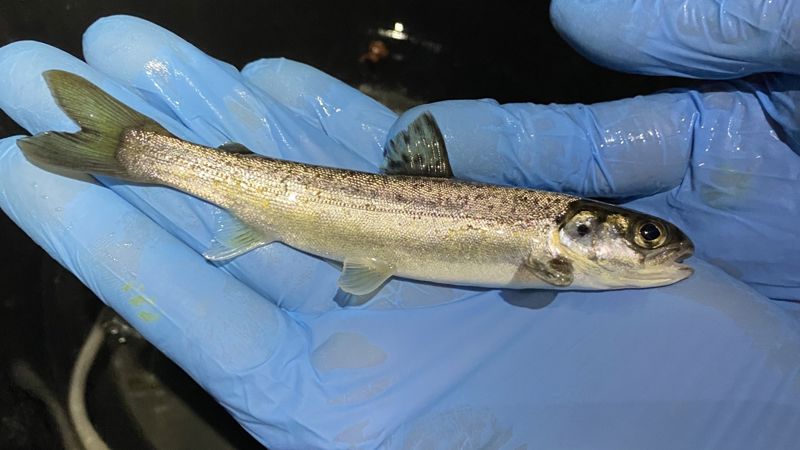River Usk project shines a light on challenges for salmon

Results from a project tracking young salmon (smolt) in the River Usk have revealed some of the barriers facing the species in their efforts to migrate downstream.
Smolt is the name given to the stage in a young salmon’s life when it migrates to sea in the spring.
Atlantic salmon spend their juvenile phase in rivers before migrating to sea to grow and mature, and then return to their river of origin to spawn. Free and unimpeded access between the river and the sea is essential for salmon to complete their life cycle.
The Natural Resources Wales (NRW) River Usk Smolt Telemetry Project was established in 2021 aimed at tracking the passage of the fish along the catchment during this crucial period of their lives.
Each year the project can tag up to 100 smolts in the upper River Usk catchment with small acoustic transmitters. Approximately 55 static acoustic listening devices have also been installed along the river, specifically up and downstream of potential barriers, to record the passing tagged fish and track their movements.
Information collected from the listening devices provides an insight into the movements of the smolts. The devices also provide data related to survival rates and migration behaviour, helping to inform future salmon management and conservation work.
The results have shown that, as the smolts migrate to the sea during the spring, they can experience difficulties overcoming weirs and other man-made barriers in the river, especially if the river is in low flow.
The project has gathered data in wet and dry springs, and has shown that tagged fish can experience significant delays at certain structures, which is further compounded by low flows in dry years.
River levels have a huge effect on both passage speed and survival. Tracking data has shown that in a dry year only 24% of tagged smolts successfully reach the sea, rising to 67% in a wet year.
Results also showed that not only were the numbers of fish reaching the sea lower in a dry year, they were in fact taking longer to leave the river – five weeks longer in some instances. Some fish were spending in excess of a month trapped above Brecon weir.
Oliver Brown, Aquaculture Officer leading the project for NRW said: “The project has evolved over the last couple of years and is giving us a good indication of what’s happening to these fish at a critical point in their life cycle.”
“From the tracking data, which gives us fish passage, speed and survival, we can see that the highest loss per km during seaward migration is in the impounded section of water above Brecon weir.”
The work provides evidence supporting improvements that are happening this year on the River Usk as part of the Four Rivers for LIFE project.
The Four Rivers for LIFE project is installing a new smolt pass on the weir. The pass will create an improved passage route (or channel) in the weir for smolts migrating downstream.
Oliver adds that: “With specialist equipment and software we can now use fine scale tracking to plot the movements of individual fish at the weir face. This allows us to see how they pass over the weir in its current form, and how they will use the new smolt pass when installed, ensuring it’s working as expected.”
Susie Kinghan, Four Rivers for LIFE Manager said: “The smolt tracking research has been of significant importance to us as a project. The fish-pass work we are doing on the weir will help salmon and other species to move freely downstream, helping to increase their dangerously low numbers and ensure the long term resilience of this species in the River Usk.”
In 2023 Atlantic salmon were reclassified from ‘Least Concern’ to ‘Endangered’ in Great Britain by the IUCN (International Union for Conservation of Nature) as a result of a 30-50% decline in British populations since 2006, with a 50-80% projected decline between 2010-2025.
The River Usk is a SAC (Special Area of Conservation) which means it is of international importance for its wildlife and plants such as Atlantic salmon, lamprey, shad, bullhead, otter and water crowfoot.
The Four Rivers for LIFE Project is funded by the EU LIFE Programme with support from Welsh Government and Welsh Water.
The River Usk Smolt Telemetry Project is part of NRWs Salmon and Sea Trout Plan of action, which aims to understand and address the many factors contributing to the decline in these fisheries. Watch a video from 2022 about the work here
